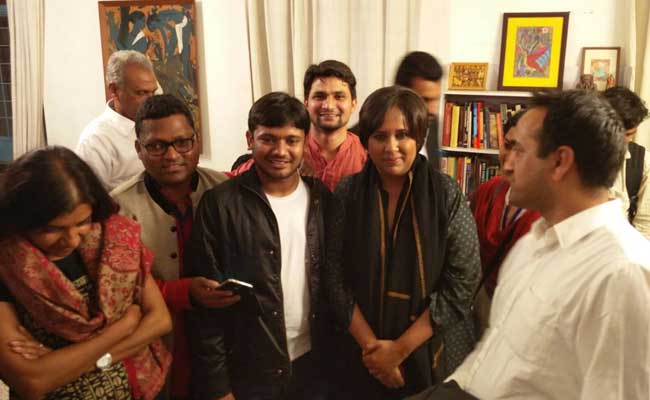The first thing I noticed was his smile - a boyish, toothy grin that travelled all the way up to his eyes that still glimmered with hope and optimism, despite having spent the last 23 days in prison.

On the leafy campus grounds of the 46-year-old institution was an air of anticipation and excitement as news spread Kanhaiya, their student union's President, was back. But no one knew where he was or when he would emerge to address them.
As I downed my nth cup of nimbu chai (lemon tea) and thought of the inevitable media scrum that would follow, I was beginning to wonder if I would be able to meet Kanhaiya at all. Then a source tipped us off that the student leader, whose arrest on charges of sedition catapulted him to global headlines and instant stardom, may be at the residence of Professor Ajay Patnaik, a faculty member who stood steadfast in his support for him. And so, we found ourselves standing unannounced at the door of his house, a door that was initially shut firmly in our faces when they saw our cameras.
Later, on the condition that we leave the equipment outside, we were let into a tastefully-drawn living room where the man, described by detractors as "no less dangerous than Masood Azhar", was standing in the centre, flanked by friends taking selfies! Just in that moment, Kanhaiya was neither revolutionary nor rebel nor leader; he was just a regular young guy, hanging out with his friends, mentally blocking out the terrible ordeal he had been through. The sheer normalcy of that image brought home the absurdity - and the cruelty - of all those who have, in the last few weeks, presented Kanhaiya, the son of an Anganwadi worker from Bihar, as a national security threat.

Kanhaiya Kumar is all smiles as he poses for the cameras along with his friends
Yet, when I started talking to Kanhaiya, he spoke with absolute clarity and resolve. "I had a lot of time to think in jail," he told me. "I used to watch every bit of news about me on TV, I read all the editorials. And then I thought, everyone has said something about me; everyone thinks they know me, so many people have judged me. Now, I will write my own story... Ab main bhi likhoonga apni kahaani." His thoughts were somber, grave, even profound, but through it all, his eyes twinkled with a mix of youthful idealism and contagious naughtiness.

Kanhaiya Kumar and NDTV's Barkha Dutt in conversation after his release from jail
More than the violence unleashed on him by lumpen lawyers, what really seemed to bother him were the fake videos and morphed pictures about him. We spoke of how his case had polarised not just politics but India's television media like never before. He made a few jokes about prime time anchors who use patriotism as a shield for blusterous slander. "You weren't all like that, I watched and read everything in jail," Kanhaiya said. "The truth will prevail. I know this is a long battle and I am ready for it," he said, before being whisked away by his minders out of the back door.

"Ab main bhi likhoonga apni kahaani (Now, I will write my own story)," Kanhaiya Kumar told NDTV's Barkha Dutt
His detractors say that the political consequence of the speech, trending globally, will be zilch; outside the gates of JNU, they claim, no one cares. But the point is not whether slogans of 'Laal Salaam' still have resonance or whether Che Guevara has any appeal to today's young and restless. You don't have to be a supporter of the Left or its economic policies to recognise that Kanhaiya's passionate address - made incidentally under the protective flutter of the Indian tricolour - captured a sentiment that was in fact post-ideology. Whether Neo-liberal or Marxist, Right or Left is beside the point; what it represented was the assertion of freedom - yes 'azaadi'- from unpalatable McCarthyism and political highhandedness.

'Freedom in India,' said JNU student leader Kanhaiya Kumar as hundreds cheered (Press Trust of India photo)
At midnight, as I headed back, the campus was still bustling; the cool night breeze unable to make much difference to the heated arguments that would carry on well into the night. I thought of the ultimate irony - the man who had mainstreamed the 'Azaadi' slogan and almost created a new generation's anthem (down to rap mixes and folk tunes) was anything but free. The Delhi High Court judge who gave Kanhaiya bail used truly peculiar metaphors of infected limbs, antibiotics, surgery and gangrene to describe Kanhaiya's case - a reminder that the bail, at this stage, was strictly temporary. I wondered if Justice Prabha Rani would consider words as harsh for Tamil Nadu Chief Minister J Jayalalithaa who had demanded the release of former prime minister Rajiv Gandhi's killers on the same day that Kanhaiya's 'anti-nationalism' was being debated. I wondered too if she might have felt differently had she seen hundreds of JNU students echoing Kanhaiya's call for 'Azaadi' (not from India, but in India), their fists punching the air in solidarity. Since she had mentioned Bhagat Singh, the young revolutionary, in her bail order, I thought of whether she had seen one of his most definitive statements made during the course of his own trial: "Bombs and pistols do not make revolution. That is not our understanding. The sword of revolution is sharpened on the whetting-stone of ideas."
(Barkha Dutt is an award-winning journalist and Consulting Editor with NDTV.)
Disclaimer: The opinions expressed within this article are the personal opinions of the author. The facts and opinions appearing in the article do not reflect the views of NDTV and NDTV does not assume any responsibility or liability for the same.


